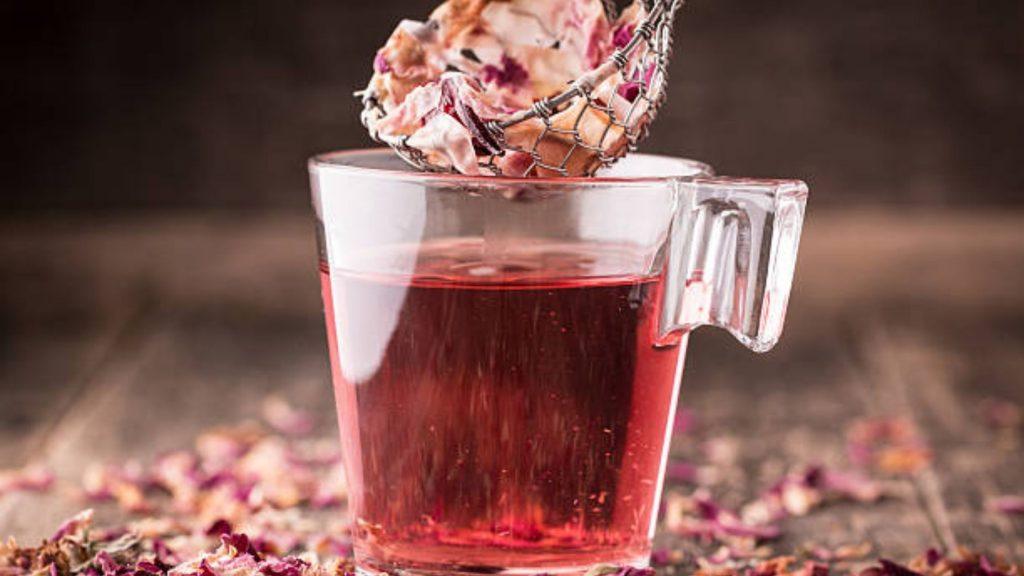Roses are beautiful flowers that have cultural, health, and aesthetic significance with references in literature, music, and art dating back millennia. There are about 130 species of roses and thousands of varieties. All roses are edible and can be used to make tea, however, some are sweeter than others. Roses are frequently used in cooking, particularly in Middle Eastern, Indian, and Chinese cuisines.
The practice of drinking rose petals with tea may have started in China. Rose tea is a key component of Traditional Chinese Medicine (TCM), where it is used to balance qi or life energy. Rose tea is a herbal beverage that is created by steeping dried rose buds or petals in water. Herbal tea is often referred to as an infusion or tisane. Rose tea is naturally caffeine-free and can be brewed into hot or iced tea. Rose tea is thought to be a potential treatment for:
- Digestive and stomach issues
- Tiredness and sleep improvement
- Irritability as well as mood fluctuations
- Menopausal symptoms and menstrual cramps
Modern research has provided some scientific evidence to back up these assertions, but additional research is required.
Nutritional facts
A cup of dried rose includes the following nutrients:
- 0 calories
- 0 gramme protein
- 0 gramme of fat
- 0 gramme carbohydrate
- 0 gramme fibre
- 0 gramme sugar
How to make rose tea at home?

Ingredients:
- Roughly cut rose buds: Its advisable to use food-grade rose buds instead of rose petals to produce high-quality rose tea since the flavour is better and more powerful. Roughly cut the rose buds so that the water may infuse and extract the flavour from between the petals.
- Water: The purity of the water is a key component of what makes tea taste wonderful. When feasible, use filtered water.
Steps to be followed for warm rose tea
- Bring water to a boil.
- Boil filtered water instead of tap water. The more flavorful the water, the better the rose tea will taste. Bring some extra water to a boil to reheat your teapot.
- Warm up the teapot.
- Fill your teapot halfway with boiling water and stir it around. Remove the water. To correctly brew tea, this step should always be included. It’s essentially the same concept as preheating an oven.
- Fill the teapot halfway with boiling water and add the chopped dried rose buds. Cover and steep the teapot.
- To keep the water hot, keep your teapot covered.
- Pour boiling tea into a teacup after straining rose buds.
Steps to be followed for iced rose tea
- In a pitcher or glass container, combine chopped dried rose buds and water. Cover and place in the refrigerator to chill the brew.
- Use filtered water that is cool or room temperature. (A cold brew tea pitcher with a built-in strainer makes it simple.)
- Pour tea into a cup after straining rose buds.
- Because cold brewed tea is already iced, it is not necessary to add ice.
Benefits of rose tea

Rose tea contains a high amount of vitamins and antioxidants. It contains Vitamins E and C, which are two of the most effective vitamins for maintaining good skin. Other benefits of Rose Tea include:
1. Hydration and weight loss benefits
Rose tea is primarily made up of water. Dehydration can result from not drinking enough water, which can cause weariness, headaches, skin problems, muscle cramps, low blood pressure, and a high heart rate. As a result, it is critical to drink plenty of water throughout the day by consuming water-rich foods and drinking plain water, teas, coffee, and other beverages.
Unfortunately, many people have trouble consuming enough water during the day. As a result, a light and flavorful beverage like rose tea can assist you in meeting your water requirements. Water can also help you lose weight by speeding up your metabolism. In fact, consuming 17 ounces (500 ml) of water can boost your metabolism by up to 30%, according to research.
2. Ease menstrual pain
Menstrual pain affects over 50% of the female population with some experiencing nausea, exhaustion, back pain, headaches, and diarrhea while on their period. While medications can help, sometimes, alternative or natural remedies are preferred – rose tea is an excellent example, as it may not only assist to regulate hormones and maybe relieve uterine congestion, but it may also help to alleviate cramps and mood swings that are commonly linked with menstruation.
3. Lower chronic diseases
Antioxidants are chemicals that aid in the fight against the effects of free radicals. These are reactive chemicals that induce cellular damage and oxidative stress, which have been linked to a variety of diseases and premature aging. Rose tea’s phenol content and antioxidant activity were found to be equal to or greater than green tea’s in a study of 12 rose varieties.
Rose petals are also high in phytonutrients, which are antioxidant-rich plant chemicals. Phytochemicals have been shown in studies to help prevent the creation of cancer cells. Some scientists believe that including enough of them in your diet can lower your cancer risk by up to 40%.
4. Immune system
Rose tea is strong in Vitamin C, an antioxidant that is important for our bodies’ healing and infection-fighting abilities. According to one study, rose tea may also aid with flu-like symptoms such as coughing and congestion. However, further research is needed to fully understand the impacts on human immune systems.
According to studies, the scent of rose tea may relieve tension and anxiety. Stress is known to lower the body’s immunity, increasing the likelihood of being ill. While research on the psychological advantages of a rose for humans is ongoing, inhaling the perfume of your tea before drinking it may help you relax.
5. Anti-inflammatory properties
According to studies, the anti-inflammatory effect of powdered rose petals is comparable to that of aspirin or ibuprofen. Rose tea may also help to relieve inflammation-related pain, such as that induced by a physical injury.
6. Helps elevate mood
Tea’s natural elevating properties make it a good choice for anyone who is feeling down, sad or unduly stressed. The benefits of alternative medicine may believe rose tea can help people suffering from distress.
7. Helps regulate sleep
Rose tea’s potential natural sedative properties make it a great drink to end the night with since it can help to relieve tension and possibly regulate sleep patterns and Circadian rhythm.
8. Aids in respiratory Distress
Soothing the respiratory system, lungs, and throat is a common prescription or recommendation of rose tea. If suffering from a cold or flu, rose tea is a great option. It may also aid in the removal of mucus and phlegm, which can harbor bacteria and other diseases.
9. Caffeine-free alternative
Caffeine is a chemical found in a variety of drinks, mostly being tea, coffee, and hot chocolate. Caffeine has several favorable effects, including decreased fatigue and increased alertness and energy levels; nevertheless, some people choose to avoid it or are unable to endure its adverse effects.
Caffeine, for example, may raise blood pressure and create anxiety in some people. This is where rose tea comes into play. It has a relaxing impact on your body and reduces jitters because it is naturally caffeine-free. However, bear in mind that some rose teas are a blend of ordinary caffeinated tea and rose petals, so if you’re looking for a caffeine-free option, aim for 100% rose petal tea.
Also read:



now I have to look for a chanya rose in my area and I will drink it with my beloved! Very useful and tasty did not know!